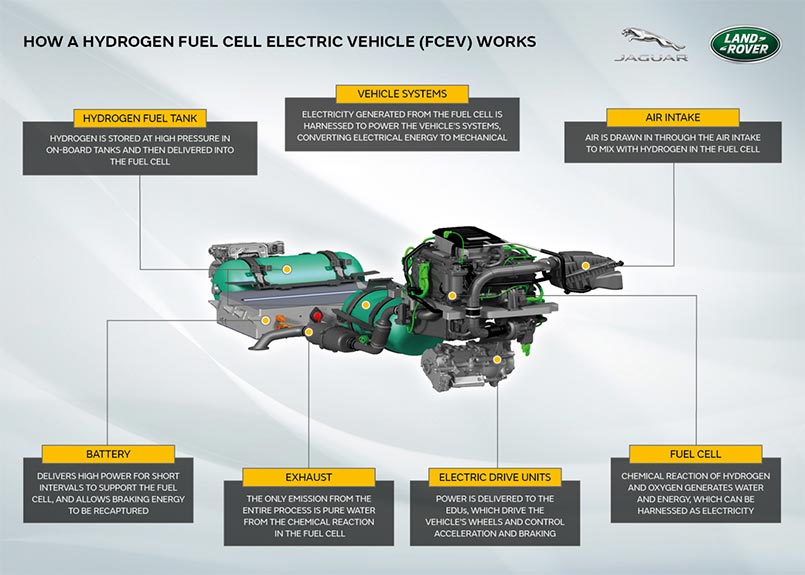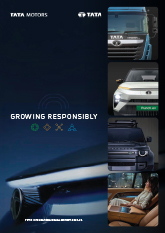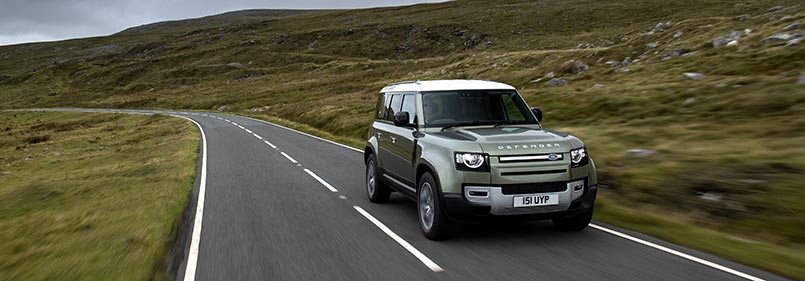JLR Press Archive -
June 14, 2021
Jaguar Land Rover to develop hydrogen-powered defender fuel cell prototype
- Jaguar Land Rover announces hydrogen concept to be based on new Land Rover Defender
- Hydrogen fuel cell electric vehicle (FCEV) prototype to begin testing in 2021
- Hydrogen FCEVs forecast to top 10 million by 2030 with 10,000 refuelling stations worldwide*
- Project part of company’s aim to achieve zero tailpipe emissions by 2036 and net zero carbon emissions across supply chain, products and operations by 2039
 Jaguar Land Rover is developing a prototype hydrogen fuel cell electric vehicle (FCEV) based on the new Land Rover Defender, with testing scheduled to begin this year.
Jaguar Land Rover is developing a prototype hydrogen fuel cell electric vehicle (FCEV) based on the new Land Rover Defender, with testing scheduled to begin this year.
The FCEV concept is part of Jaguar Land Rover’s aim to achieve zero tailpipe emissions by 2036, and net zero carbon emissions across its supply chain, products and operations by 2039, in line with the Reimagine strategy announced last month.
FCEVs, which generate electricity from hydrogen to power an electric motor, are complimentary to battery electric vehicles (BEVs) on the journey to net zero vehicle emissions. Hydrogen-powered FCEVs provide high energy density and rapid refuelling, and minimal loss of range in low temperatures, making the technology ideal for larger, longer-range vehicles, or those operated in hot or cold environments.
Since 2018, the global number of FCEVs on the road has nearly doubled while hydrogen refuelling stations have increased by more than 20%**. By 2030, forecasts predict hydrogen-powered FCEV deployment could top 10 million with 10,000 refuelling stations worldwide*.
Jaguar Land Rover’s advanced engineering project, known as Project Zeus, is part funded by the government-backed Advanced Propulsion Centre, and will allow engineers to understand how a hydrogen powertrain can be optimised to deliver the performance and capability expected by its customers: from range to refuelling, and towing to off-road ability.
The zero tailpipe emission prototype New Defender FCEV will begin testing towards the end of 2021 in the UK to verify key attributes such as off-road capability and fuel consumption.
To deliver Project Zeus, Jaguar Land Rover has teamed up with world class R&D partners, including Delta Motorsport, AVL, Marelli Automotive Systems and the UK Battery Industrialisation Centre (UKBIC) to research, develop and create the prototype FCEV.

Ralph Clague, Head of Hydrogen and Fuel Cells for Jaguar Land Rover, said: “We know hydrogen has a role to play in the future powertrain mix across the whole transport industry, and alongside battery electric vehicles, it offers another zero tailpipe emission solution for the specific capabilities and requirements of Jaguar Land Rover’s world class line-up of vehicles. The work done alongside our partners in Project Zeus will help us on our journey to become a net zero carbon business by 2039, as we prepare for the next generation of zero tailpipe emissions vehicle.”
NOTES TO EDITORS
* Hydrogen Council ** International Energy Agency (IEA)
For more information on the government backed APC funding please visit: https://www.gov.uk/government/news/735-million-to-boost-green-economic-recovery-in-automotive-sector
Editors’ notes
For more information about Jaguar Land Rover’s Reimagine strategy please visit: https://www.jaguarlandrover.com/reimagine
About Jaguar Land Rover: Reimagining the future of modern luxury by design
Jaguar Land Rover is reimagining the future of modern luxury by design through its two distinct, British brands.
Our current model range embraces fully electric, plug-in hybrid and mild-hybrid vehicles, as well as the latest diesel and petrol engines. Our class-leading Jaguars and Land Rovers are in demand around the world and in 2020 we sold 425,974 vehicles in 127 countries. Land Rover is the global leader of luxury SUVs through its three families of Range Rover, Discovery and Defender. Jaguar is the first ever brand to offer a premium all-electric performance SUV, the Jaguar I-PACE.
At heart we are a British company, with two major design and engineering sites, three vehicle manufacturing facilities, an Engine Manufacturing Centre and a Battery Assembly Centre in the UK. We also have vehicle plants in China, Brazil, India, Austria and Slovakia. Three of our seven technology hubs are in the UK – Manchester, Warwick (NAIC) and London – with additional sites in Shannon, Ireland, Portland, USA, Budapest, Hungary and Shanghai, China.
Central to our Reimagine strategy is the electrification of both the Land Rover and Jaguar brands with two clear, distinct personalities. All Jaguar and Land Rover nameplates will be available in pure electric form by the end of the decade. This marks the start of the company’s journey to become a net zero carbon business across its supply chain, products and operations by 2039.
As a wholly owned subsidiary of Tata Motors since 2008, Jaguar Land Rover has unrivalled access to leading global players in technology and sustainability within the wider Tata Group.
Jaguar Land Rover PR social channels:







 Jaguar Land Rover is developing a prototype hydrogen fuel cell electric vehicle (FCEV) based on the new Land Rover Defender, with testing scheduled to begin this year.
Jaguar Land Rover is developing a prototype hydrogen fuel cell electric vehicle (FCEV) based on the new Land Rover Defender, with testing scheduled to begin this year.
